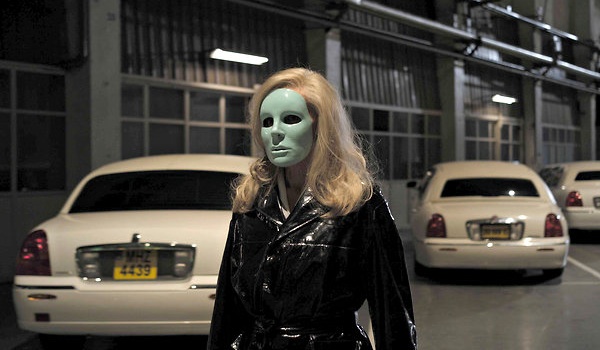Holy Motors Review
Trying to describe one’s feelings toward Leos Carax’s Holy Motors is an exercise as futile as trying to explain the plot of the film, but here goes nothing.
One man—Monsieur Oscar (Denis Lavant)—rides around Paris in a limousine, which stops periodically for Oscar to step out and become a new person. At one stop, he’s an old beggar. At another, he’s a father. And at another, he’s a hideous creature who eats everything (flowers, fingers, hair, money) in sight.
The film establishes this rhythm early and sticks with it through its conclusion. But as things progress and we learn bits and pieces (nothing more) about Oscar, it challenges its own structure. His visits grown longer. He injures himself. He deviates from the plan provided by his driver, Céline (Edith Scob).
It’s very surreal stuff—a real puzzle. From beginning to end (literally the first and last shot), things happen that Carax either doesn’t care to or can’t explain. In that respect, it’s quite a frustrating film. There was only so far I was willing to go with him if he wasn’t willing to throw me a bone.
But he actually does—it just takes a while. That bone is the film’s structure, which allows you to come and go as you please. Not enjoying one of Denis Lavant’s nine or ten characters? Just wait ten minutes, and he’ll be back with someone new. It’s arguably not the best way to watch this or any film, but there’s so much to be inspired by here, so much you won’t see from any other filmmaker in the world. That these brilliant bits and pieces don’t quite come together in a coherent way is a little disappointing, but nonetheless OK.
Denis Lavant’s performance is awe-inspiring. He brings a physicality, an ickiness to the film that’s tough to shake. Like the film itself, it’s work that will leave you cold, but one almost has to view Holy Motors as a collaboration between two brave artists. The film relies on Lavant’s physical and theatrical nimbleness just as much as it does Carax’s wild ideas and vision.
It’s hard to say any more about Holy Motors because it’s so obtuse. There’s clearly a lot bubbling under the surface, but upon first watch, you’re so in the moment it’s hard to contemplate the film’s bigger themes. Carax clearly feels a great deal of passion toward cinema, and this is his love letter to the entire craft of filmmaking. Some semblance of sensical plotting would have been nice, but even as messy as it is, Holy Motors is still a ride worth taking.

















One Response to Holy Motors Review